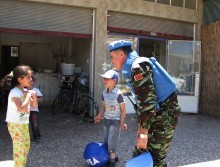With more and more dying in Syria, the world is reacting with urgency. Talking with urgency. Urgent meetings. They are urgently moving, but accomplishing little. Wasting haste just results in nothing. But this week has offered a little hope.
The United States has in many ways led the urgent race to nowhere. Lots and lots of talking has characterized the American approach to diplomacy in the Middle East, and so far Bashar al-Assad has killed thousands.
But US President Barack Obama did something this week that hints the US may be acting urgently, not just reacting. In a phone conversation with Turkish Prime Minister Recep Tayyip Erdoğan, the two leaders discussed coordinating “efforts to accelerate a political transition in Syria, which would include the departure of Bashar al-Assad and be responsive to the legitimate demands of the Syrian people,” according to a White House statement.
The phone call sounds innocuous enough—according to the Turkish Hurriyet Daily News much of the discussion centered around an interim government if and when Assad loses power. That is not the most pressing matter.
But getting Assad out of power is certainly on the minds of both Turkey and the US. The White House statement was actually tougher on Assad than the leaked report to Hurriyet, which makes one wonder what all was discussed between Obama and Erdoğan.
This is a time to act urgently. Assad is killing more and more and more. Tanks, artillery, helicopters—and an arsenal of chemical weapons looming as a potential last resort. Such an outcome would be an utter catastrophe, and yet still not as bad as Assad transferring such weapons to Hezbollah terrorists in Lebanon.
As long as Assad stays in power, the more and more likely such results are. And as Israeli Defense Minister Ehud Barak warned recently, the longer the fighting continues in the Syrian civil war, the more bitterness will build. The risk of vigilante killings, or even genocide of the minority Alawite sect of Assad, is a real concern.
So hopefully, Obama and Erdoğan talked… about doing something. A real step would be to move NATO troops into the Turkish-Syrian border region. It could ostensibly be to protect Turkey, a NATO member who has taken some indiscriminate Syrian fire. It would also send quite a warning to Assad.
Another key step would be to offer intel to the Syrian rebel fighters, especially in the battleground city of Aleppo, where the fighting is raging now. Satellite imaging of Syrian troops could be a critical benefit to the rebels.
So far, the US has effectively denied giving the rebels anything of substantial military value. Whether that’s political talk with double-meanings in public while the US is doing more in private, is unclear. But talking about helping the rebels would be a wise step too.
Fighting a war in Syria would be terrible. The US should not get militarily involved unless absolutely necessary. And there are multiple stepping stones to take prior to such an option. A buffer zone just inside the Syrian border with Turkey would be a major move—violating Syrian sovereignty—but it could protect civilians and send a message.
For now, messages are enough. Even before a buffer zone, sending troops to the Turkish border or publicly talking about backing the rebels in real terms could be just the message needed.
Behind the scenes, the US should be trying to convince Russia to accept Assad as a refugee. Giving the murderous Syrian leader asylum is disgusting, but saving lives is more important.
That’s why messages—sent with actions and not words—are needed. To convince Assad he has to take an out while he still has it. To make it clear he won’t survive this war otherwise, perhaps literally. To stop the violence before the region is put at risk.
Before Israel has to consider bombing convoys of nerve gas heading to Lebanon. Before the embittered rebels begin slaughtering minorities allied with Assad. Before Lebanon is destabilized by a nearby civil war and a flood of refugees. Before it’s too late.
Because right now, the reports that France is considering calling an urgent meeting at the UN on Syria just isn’t enough. If the West responds to the Syrian conflict with mere urgency and no action, that sense of urgency could be replaced with a related feeling: panic.
(By Joshua Spurlock, www.themideastupdate.com, July 31, 2012)

